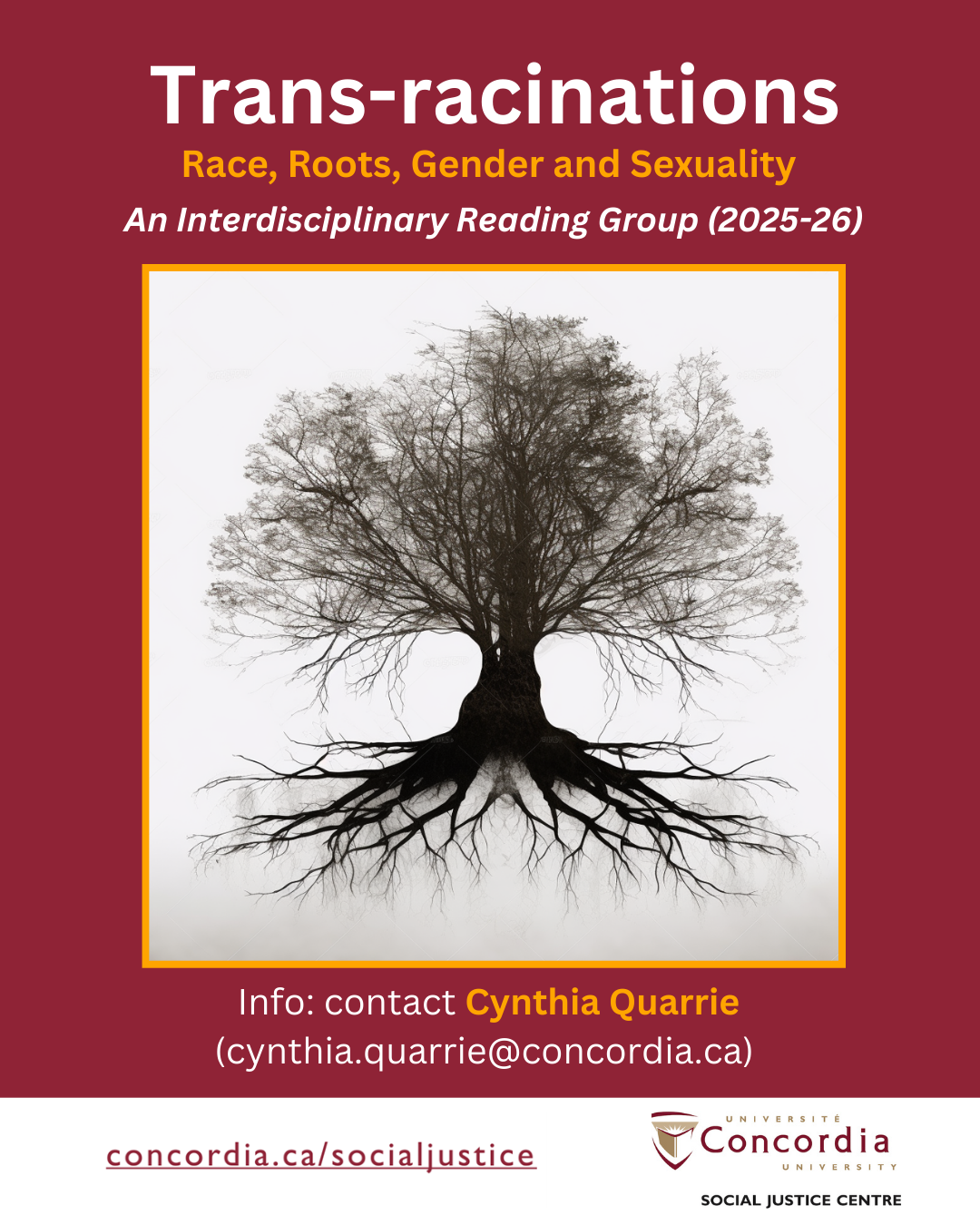Date & time
1 p.m. – 3 p.m.
This event is free.
J.W. McConnell Building
1400 De Maisonneuve Blvd. W.
Room LB 659.04
Yes - See details
The second session (on Friday October 24 from 1 to 3 pm) will be on three (shortish and very readable) chapters from Saidiya Hartman's 2019 book, Wayward Lives, Beautiful Experiments: Intimate Histories of Riotous Black Girls, Troublesome Women, and Queer Radicals.
• "A Note on Method" (only 3 pages)
• "An Atlas of the Wayward" (39 pages)
• "The Anarchy of Colored Girls Assembled in a Riotous Manner" (27 pages).
If this is too much reading, please concentrate on "The Anarchy" chapter. The book is available in hard copy at the library. If you require PDFs of these chapters, please contact Cynthia Quarrie (cynthia.quarrie@concordia.ca).
All are welcome! Professor Jesse Arsenault will be leading the discussion.
This interdisciplinary reading group is open to all.
How are gender and sexuality related to notions of “rootedness” and place, and how do they intersect with mobility, passing, crossing? In a political moment marked by resurgent white settler neo-nationisms and the violent policing of gendered identities, can (or should) the metaphor of rootedness be decolonized and reimagined, particularly in ways that engage with gender, race, and sexuality, and that promote more inclusive, reciprocal, and sustainable forms of belonging?
Metaphors of roots and rootedness, and their obverse — rootlessness, deracination, even “eradication”— are, as Christy Wampole puts it, “site[s] of extreme figuration," which suggests the extent to which humans are marked in one way or another by their connection (or lack thereof) to place. Rootedness is often linked to the feminine figure of the mother, whose stasis, domesticity, and “groundedness” maintains an unchanging home base for masculine adventure, violence, and territorial expansion. The figure of the (racialized) mother, uprooted and transported across continents, oceans, and empires, becomes a generative site of aporia and imagination for scholars of transatlantic and transpacific movement. Attachment to place is also at the heart of many anti-colonial struggles, debates around environmental custodianship (the idea that Indigenous Land and Water defenders should lead North American climate movements for example), but also eco-fascist and anti-immigrant nationalisms around the globe.
Can we reimagine connections to land and place in ways that unsettle white supremacy, racial capitalism, settler colonialism, and heteropatriarchy? How might “sacred” attachment to place be re-conceived without reinscribing essentialist mythopoetics that centre heteronormative whiteness? This reading group will explore alternative ways of conceiving rootedness as dynamic, relational, and decolonial—resisting the violence of ownership and territoriality while recognizing the deeply interconnected nature of land, body, and identity.
The first meeting was on Friday, September 26 from 1-3 pm in LB 659.04.
Reading : a chapter from C. Riley Snorton's book, Black on Both Sides: A Racial History of Trans Identity. The chapter is titled, "Trans Capable: Fungibility, Fugitivity, and the Matter of Being."
The reading is available as an e-book through the Concordia library, but we can also send a PDF by email to anyone who would like it. Contact Cynthia for the reading: cynthia.quarrie@concordia.ca
Co-organized by Cynthia Quarrie, Gage Diabo and Jesse Arsenault.
All are welcome to participate!
The second meeting is scheduled to take place on Friday, October 24 (same room and time).
The third meeting will take place on Friday, November 21 (same room and time).

© Concordia University